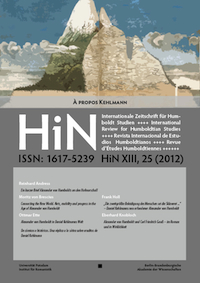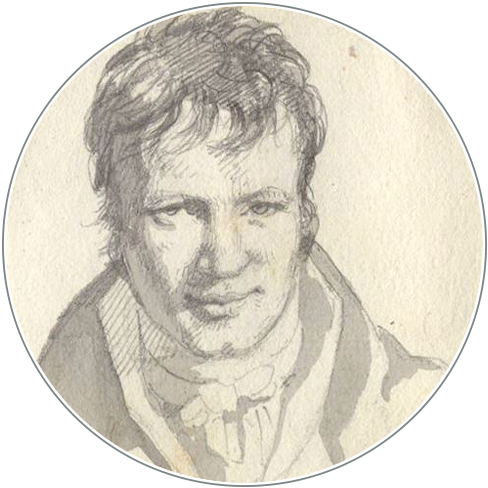„Die zweitgrößte Beleidigung des Menschen sei die Sklaverei ...“. Daniel Kehlmanns neu erfundener Alexander von Humboldt
DOI:
https://doi.org/10.18443/171Keywords:
Carl Friedrich Gauß, Daniel Kehlmann, Die Vermessung der Welt, Schwerpunktthema „À propos Kehlmann“Abstract
Abstract
With his novel Measuring the World, Daniel Kehlmann pretends „to make visible a reticent and ignored truth“. In leaving the reader intentionally in doubt about what is historically proven and what is invented, Kehlmann’s book prompts misreadings. The article compares the main traits of the „Kehlmannian“ against those of the historical Alexander von Humboldt and documents their mis-matching in some central attributes. Moreover, Kehlmann‘s public and self-declared role as an informed scholar is questioned, especially when he uses fictional Humboldt quotes as if they were a matter of fact (i.e. as part of a foreword to a recent text edition on Charles Darwin). The article comes to the conclusion that those interested in general historical knowledge should not take this novel very seriously.
Zusammenfassung
Daniel Kehlmann gibt vor, mit seinem Roman Die Vermessung der Welt „verschwiegene oder übersehene Wahrheiten sichtbar“ zu machen. Dadurch, dass er die Leser bewusst im Zweifel lässt, was historisch belegt und was erfunden ist, entstehen Missverständnisse. Der Beitrag analysiert die wichtigsten Charakteristika des Kehlmann‘schen und des historischen Alexander von Humboldt und weist nach, dass diese nicht übereinstimmen. Der Aufsatz fragt nach Kehlmanns Rolle, der in der Öffentlichkeit gerne die Pose des Gelehrten einnimmt, seine Erfindungen jedoch nicht offenlegt und sie als angebliches Humboldt-Zitat sogar in einem wissenschaftlichen Text publiziert. Der Beitrag kommt zu dem Schluss, dass alle, die etwas für ihre Allgemeinbildung tun möchten, bei Die Vermessung der Welt an der falschen Adresse sind.
Resumen
Con su novela La medición del mundo Daniel Kehlmann pretende “de hacer visible una verdad callada e ignorada”. Pero esa verdad es tramposa. El libro de Kehlmann intencionalmente provoca confusiones sobre lo que son los hechos históricos y lo que es pura ficción. Por ende, el artículo compara las principales características del Humboldt „kehlmanniado“ con la figura histórica y comprueba sus más evidentes incongruencias. Además, se cuestiona el papel público del auto-declarado erúdito e informado autor Kehlmann, por ejemplo cuando éste introduce – sin declararlo – citas fictícias de Humboldt al prólogo de una edición reciente con textos de Charles Darwin. Con todo eso, el artículo llega a la conclusión de que todos aquellos interesados en conocimiento general histórico no deberían tomar la novela en serio.
Downloads
How to Cite
Issue
Section
License
Copyright (c) 2012 Frank Holl

This work is licensed under a Creative Commons Attribution-NonCommercial 4.0 International License.
HiN operates under a Creative Commons-Licence (CC BY-NC 4.0), which permits the reproduction of articles, free of charge, for non-commercial use only and with the appropriate citation information. All authors publishing with HiN accept these terms of publication.
Authors retain the copyright for their articles and reviews. Copyright of the layout and design of HiN articles remains with the journal and cannot be used in other publications.










